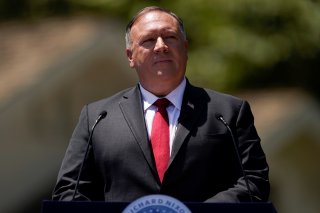The True Lessons of Nixon and Kissinger’s China Strategy
Secretary of State Mike Pompeo’s speech at the Nixon Library misunderstood Richard M. Nixon’s geopolitical approach to China.
In a historic speech yesterday, Secretary of State Mike Pompeo delivered a blistering attack on China at the Nixon Library in California that seeks to recalibrate American policy toward China. But it misunderstood Richard M. Nixon and Henry Kissinger’s fundamental approach. Instead of seeking confrontation with China, Nixon and Kissinger sought to play the “China Card” by deploying it against the Soviet Union.
While the speech itself needs to be read in its entirety, Pompeo’s remarks, which represent a coordinated effort to recalibrate U.S. foreign policy towards China in a number of different speeches over the last few weeks by other senior Trump Administration officials, clearly mean only one thing: Trump’s top foreign policy officials are pushing for a move from an engagement and peaceful competition with Beijing to what can only be described as a twenty-first-century version of Cold War-style containment. Indeed, Pompeo clearly meant for his remarks to be interpreted as the “Evil Empire” speech of 2020. Whether Trump himself will adopt this course remains an open question.
While Pompeo was careful not to attack former President Nixon for his decision to engage with China, there was no mention of the reasons why Nixon and Kissinger made this historic move, which was unquestionably the right move at the right time. Pompeo quotes from a famous 1967 Foreign Affairs piece by Nixon that made the case for engagement with China. Nixon wrote,
“Taking the long view, we simply cannot afford to leave China forever outside of the family of nations…The world cannot be safe until China changes. Thus, our aim – to the extent we can, we must influence events. Our goal should be to induce change [emphasis mine].”
Foreign policy realists throughout history are great at using rhetorical flash and the invocation of universal norms to mask their true geopolitical ambitions–it makes such aspirations more easily tolerable in today’s world, providing a sort of moralistic blanket to hide their real intentions. In this instance, Nixon was fully cognizant that the U.S. was struggling thanks to the large financial and military commitments needed to sustain the Vietnam War and that the Soviet Union needed to be checked. In short, Nixon did not seek to change China in America’s image, as Pompeo suggests. Rather, Beijing and Washington agreed to cooperate because they both viewed the rise of Soviet power as a bigger threat to their shared mutual interests. Realpolitik, in other words, ruled.
The conservative journalist Hugh Hewitt appeared to sense this lack of historical context in Pompeo’s remarks. He asked Pompeo in the opening question:
“My first question has to do with the context of the president’s visit in 1972. You mentioned the Soviet Union was isolated, but it was dangerous. He went to the People’s Republic of China in 1972 to try and ally and combine interests with them against the Soviet Union; it was successful. Does Russia present an opportunity now to the United States to coax them into the battle to be relentlessly candid about the Chinese Communist Party?”
Pompeo replied:
“So I do think there’s that opportunity. That opportunity is born of the relationship, the natural relationship between Russia and China, and we can do something as well. There are places where we need to work with Russia. Today – or tomorrow, I guess it is, our teams will be on the ground with the Russians working on a strategic dialogue to hopefully create the next generation of arms control agreements like Reagan did. It’s in our interest, it’s in Russia’s interest. We’ve asked the Chinese to participate. They’ve declined to date. We hope they’ll change their mind.
It’s these kind of things – these proliferation issues, these big strategic challenges – that if we work alongside Russia, I’m convinced we can make the world safer. And so there – I think there is a place for us to work with the Russians to achieve a more likely outcome of peace not only for the United States but for the world.”
Pompeo’s speech should have encompassed why Nixon wanted better relations with China: the rise of Soviet power and a widespread belief America was in decline. America has ample ways to use alliances and partnerships with nations that it may not exactly align with naturally to contain China‘s own rise. When we forget why Nixon and Kissinger made the foreign policy choices they did, America’s national interests suffer. Now, as then, Nixon and Kissinger’s approach to international relations offers important lessons that we ignore at our peril.
Harry J. Kazianis serves as a Senior Director at the Center for the National Interest, founded by President Richard M. Nixon. You can follow him on Twitter: @Grecianformula.

